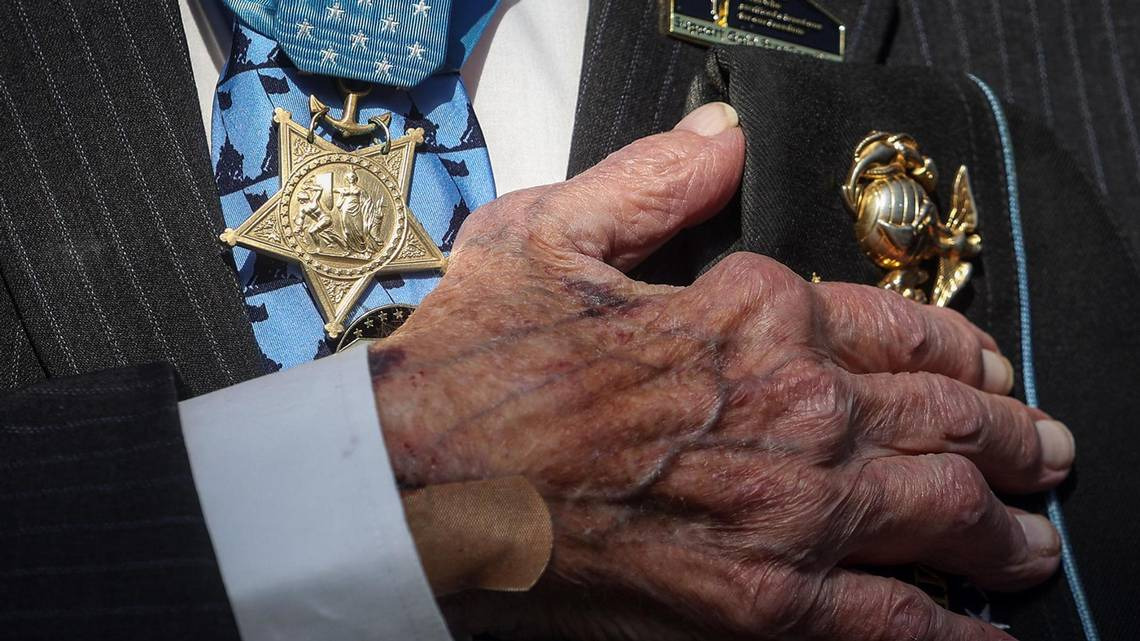
17 May Let’s Not Forget the Concept of Honor
By Thomas R. Guskey, Professor Emeritus, University of Kentucky originally published in The Lexington Herald Leader, May 16, 2022.
Photo: World War II veteran and recipient of the Medal of Honor Hershel Woodrow Williams puts his hand over his heart during the invocation at the National Medal of Honor Museum groundbreaking ceremony in Arlington on Friday, March 25, 2022. Amanda McCoy amccoy@star-telegram.com
As the school year draws to a close, and we prepare to celebrate this year’s honor graduates, we should reconsider how we define “honor.”
Educators today want students to achieve a variety of both academic and non-academic goals. This stems from recognition that factors other than academic competence often have profound influence on students’ success in school and beyond.
Researchers at the University of Chicago’s Consortium on School Research are investigating the importance of student qualities such as perseverance, grit, tenacity, and self-discipline. Investigators at the Harvard Graduate School of Education’s Ecological Approaches to Social Emotional Learning (EASEL) Laboratory are studying the value of empathy, perspective-taking, self-efficacy, and growth mindset. This work will help establish the importance of such skills and aid educators in efforts to foster their development.
Notably absent in these efforts, however, is the trait of honor. This is especially ironic since few other personal traits have been held in higher esteem or valued longer throughout history than that of honor.
Traditionally, honor has been the foundation of every area of public service. The highest award offered by the U.S. State Department is the Distinguished Honor Award given in recognition of exceptionally outstanding service of marked national or international significance. The Honor Code at every military academy defines a system of ethics for those studying there. The Honor Code at the U.S. Military Academy at West Point, for example, states, “A cadet will not lie, cheat, steal, or tolerate those who do.”
The U.S. Army Core Values similarly makes honor a foundational element, defined as “a matter of carrying out, acting, and living the values of respect, duty, loyalty, selfless service, integrity and personal courage in everything you do.” The oldest and most prestigious award that may be given to any U.S. military service member is the Medal of Honor.
Yet according to Terry Newell, author of the best-seller To Serve with Honor, the concept of honor has been lost in public service in modern times. Newell argues that although honor should pervade all those who serve in government, today it is confined only to those in the military.
In the quest to help students develop 21st century skills and become college and career ready, educators, too, have lost sight of the importance of honor. We focus on the qualities and characteristics that contribute to professional or financial success, but neglect what makes that success truly meaningful. We ignore important questions about whether the means used to gain that success were good, fair, and honest. Is success worth having or a goal worth achieving if we sacrifice honor and integrity along the way?
We certainly want our students to strive for success. But we must also help students understand that just as important as success is how you gain it. No achievement in any endeavor is worth the sacrifice of honor, dignity, or integrity.
It’s time for educators to broaden the definition of honor graduates to reflect not only academic achievement but truly honorable actions by students. Let’s bestow honors on students who make special efforts to include those who are different and students who intervene to prevent someone from being bullied in or out of school. Let’s recognize students who set aside their own self-interests to help others on difficult tasks or assignments. Let’s acknowledge students for acts of kindness, generosity, empathy, and civic responsibility. Let’s recognize students who put others before themselves and champion the cause of social justice.
We need to move beyond the traits that contribute to individuals’ professional or career success to consider what will help them become persons of honor, dignity and integrity. We need to assist students in developing the skills that will not only help them succeed in the world today, but will guide them in building a better world for tomorrow. More than ever, we need to recognize students whose selfless acts bring honor to themselves, their families, their school, and the entire community.




Sorry, the comment form is closed at this time.